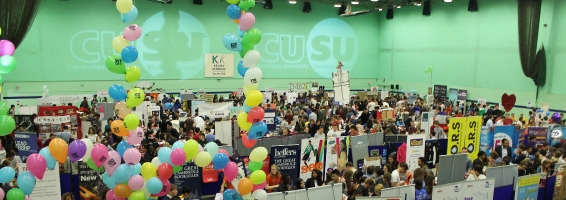What’s in a name?
With Mixed Pickle and Condiments, The Sheila and Her Dog, Stretched Drawers, Rabbit’s Ears. These are a few of the more bizarre-sounding student societies whose papers have recently arrived in the University Archives from the Proctors’ Office. Fortunately, the aims of the obscurely named are made clear in their constitutions, submitted to the Proctors as part of society registration. With Mixed Pickle and Condiments, aka Pickles, was a theatrical society; The Sheila and Her Dog met to read children’s literature aloud in funny voices; Stretched Drawers was for artists and Rabbit’s Ears for devotees of origami.
All you need to start a society is a few like-minded friends. The scale of student sociability down the decades is born out by the sheer number registered: 750 in the period 1937-2001. The bulk of the records date from the 1970s and comprise, alongside constitutions, accounts and officers’ lists, quantities of rules, term-cards and other society literature. The names and activities of 750 is far more than would be known from the surviving archives proper of student bodies available elsewhere in the University Archives and catalogued on the internet resource Janus (http://janus.lib.cam.ac.uk). So many societies are ephemeral – springing up in a burst of enthusiasm and lapsing with the graduation of their founders – they leave few if any records. In contrast, the official, annual requirement for the submitting of officers’ lists and accounts, audited by a Senior Treasurer who should be a senior member of the University, ensured the steady accumulation of paperwork in the hands of the Proctors.
It is usual to categorise the broad range of societies by their activity: political, sporting, literary, dramatic etc. Clubs for enthusiasts of music, discussion, dance, travel, social work, to name but a few, are all documented here. But it is also tempting to propose a few alternative schemas. There are the time-specific gatherings responding to events, Americans against the war in Vietnam for instance, founded in 1967, or the Committee for Italian Flood Relief, founded in 1966; and those embodying hobbies or enthusiasms of the time which now appear hopelessly dated. The Tape Recording Society got going in 1967, and aimed to teach practical sound-recording on special equipment. The Home Brewing Society was providing advice on how to make explosions in your own room from the mid 1980s. There are the very earnest; the Vegetarian Society in 1968 required its committee members to swear to forbear fish, flesh and fowl.
Then there are (an awful lot of) the very silly, out for fun: the Pembroke Anting Society for instance, PANTS for short, whose purpose was the catching of blackbirds using ants, or Grimsoc, established to promote Grim Northern Culture, or Free Love and Money, encouraging enjoyment of just that. There are the short-lived; the Cannabis Relegalisation Society never got going in 1994 because of its inability to find a willing Senior Treasurer, and several literary ventures expired after producing the first exhausting issue of a magazine, Eight Weeks for instance or Stonechat. And there are the schismatic; multiple societies pursuing the same activity simultaneously, such the Gastronomic Society and the Gourmet Society or the Film and Television Society, Film Foundation and Film Society, all in the 1980s. Why so many? Had their members fallen out?
This is an expansive, new resource for research into extra-curricular Cambridge: as fertile an area of student activity as anything happening in lecture rooms or laboratories. The catalogue of records relating to the registration of student-run University societies is online now at http://bit.ly/1wmpUuT.

